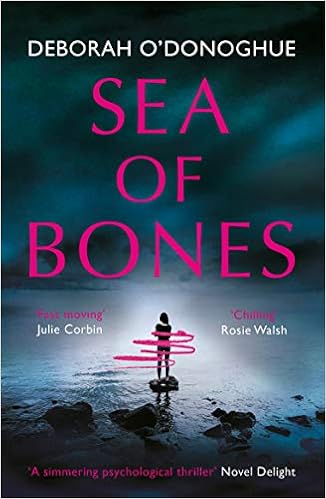Juliet MacGillivray is haunted by the death of her beloved niece, Beth
Winters. The police deemed it a suicide
but Juliet has difficulty accepting this conclusion. She sets out to investigate while visiting
her summerhouse in northeast Scotland where Beth was living while studying Fine
Art Textiles in a nearby art school. As
she begins asking questions, Juliet realizes there are people who do not
appreciate her meddling. When her
partner Declan becomes involved, he too comes to realize there are those who do
not want the truth exposed.
Several subjects are examined in the novel, one of them being mental
illness. Erica, Juliet’s twin sister and
Beth’s mother, suffers with bipolar disorder and that diagnosis is always
mentioned by the media when discussing Juliet’s position as chief of staff of a
political party, as if Juliet is somehow tainted by having a twin with mental
health issues. Juliet also believes that
the police’s determination that Beth committed suicide because of depression
was influenced by her mother having a manic-depressive illness.
The sexual exploitation of minors is another subject that receives
attention. There are scenes which may
make readers feel uncomfortable. Immigration,
political corruption, and manipulation by the wealthy also come to the fore
during Juliet’s investigation.
There is quite a bit of suspense in the book. Juliet, Declan and others who become involved
in investigating Beth’s death and those who might know something about it face
increasing danger. Threats are made and
people are hurt. The sense of danger
will keep readers reading.
An issue I have with the book is that Juliet is not a really likeable
character. For all her professed love
for her niece, they did not seem particularly close. If Juliet really knew her niece, Juliet
should have known when Beth phoned and said, “’There’s some wee things I really
need to talk to you about’” that Beth had something important to discuss. If she did know her niece’s tendency to
understate, her not calling Beth for three weeks indicates nothing positive
about her character. At one point,
Juliet realizes people think of her as “somewhat pathetic and controlling and
superior all at once” and those adjectives describe her perfectly. She does not seem to be a particularly warm
person. It seems that at least a couple
of people think of her as a “very strong lady” but she doesn’t come across as
that to me.
What also bothers me is that characters often behave
unrealistically. For example, would a
mother really bring her 13-year-old daughter to a party where drugs are openly
used and where she is in danger of being sexually molested? Would a man who helps recruit a minor for the
purpose of sexual exploitation and who viciously kills a man be so shocked when
he comes “face to face with his paymasters’ depravity” that he disobeys orders
and behaves as he does at the end?
The ending has weaknesses. The
last few events seem largely unnecessary because there is focus on a character
who doesn’t deserve attention. There is
too much falling action after the climax.
On the other hand, another character, one who played a pivotal role in
the investigation, is just dropped; she is last mentioned as sitting in silence
and shaking in shock. (Other minor
characters who are introduced in some depth seem unnecessary because they never
appear again.)
The book is not perfect but it is still an enjoyable escapist read. It touches on a number of important topics,
and the plot, though uneven, has considerable suspense.
Note: I received an ARC from the
publisher, Legend Press.

No comments:
Post a Comment